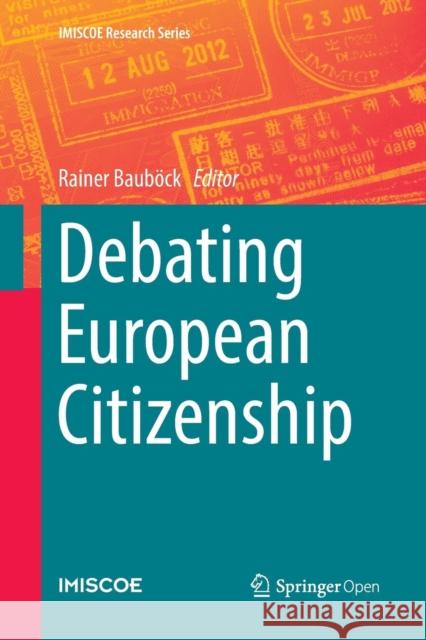Debating European Citizenship » książka



Debating European Citizenship
ISBN-13: 9783030078911 / Angielski / Miękka / 2019 / 313 str.
Debating European Citizenship
ISBN-13: 9783030078911 / Angielski / Miękka / 2019 / 313 str.
(netto: 191,66 VAT: 5%)
Najniższa cena z 30 dni: 192,74
ok. 16-18 dni roboczych.
Darmowa dostawa!
European Citizenship: Still a Fundamental Status?: Jo Shaw.- Part I: Should EU Citizens Living in Other Member States Vote There in National Elections?: EU-Citizens Should Have the Right to Vote in National Elections: Philippe Cayla and Catriona Seth.- EU Citizens Should Have Voting Rights in National Elections, but in Which Country?: Rainer Bauböck.- A European or a National Solution to the Democratic Deficit?: Alain Brun.- EU Accession to the ECHR Requires Ensuring the Franchise for EU Citizens in National Elections: Andrew Duff.- How to Enfranchise Second Country Nationals? Test the Options for Best Fit, Easiest Adoption and Lowest Costs: David Owen.- What’s in a People? Social Facts, Individual Choice, and the European Union: Dimitry Kochenov.- Testing the Bonds of Solidarity in Europe’s Common Citizenship Area: Jo Shaw.- ‘An Ever Closer Union Among the Peoples of Europe’: Union Citizenship, Democracy, Rights and the Enfranchisement of Second Country Nationals: Richard Bellamy.- Five Pragmatic Reasons for a Dialogue with and Between Member States on Free Movement and Voting Rights: Kees Groenendijk.- Don’t Start with Europeans First. An Initiative for Extending Voting Rights Should Also Promote Access to Citizenship for Third Country Nationals: Hannes Swoboda.- Voting Rights and Beyond...: Martin Wilhelm.- One Cannot Promote Free Movement of EU Citizens and Restrict Their Political Participation: Dora Kostakopoulou.- Second Country EU Citizens Voting in National Elections is an Important Step, but Other Steps Should be Taken First: Ángel Rodríguez.- A More Comprehensive Reform is Needed to Ensure that Mobile Citizens Can Vote: Sue Collard.- Incremental Changes are Not Enough - Voting Rights Are a Matter of Democratic Principle: Tony Venables.- Mobile Union Citizens Should Have Portable Voting Rights Within the EU: Roxana Barbulescu.- Concluding Remarks: Righting Democratic Wrongs: Philippe Cayla and Catriona Seth.- Part II: Freedom of Movement Under Attack: Is It Worth Defending as the Core of EU Citizenship?: Freedom of Movement Needs to Be Defended as the Core of EU Citizenship: Floris de Witte.- The Failure of Union Citizenship Beyond the Single Market: Daniel Thym.- State Citizenship, EU Citizenship and Freedom of Movement: Richard Bellamy.- Free Movement as a Means of Subject-Formation: Defending a More Relational Approach to EU Citizenship: Päivi Johanna Neuvonen.- Free Movement Emancipates, but What a Freedom This Is?: Vesco Paskalev.- Free Movement and EU Citizenship from the Perspective of Intra-European Mobility: Saara Koikkalainen.- The New Cleavage Between Mobile and Immobile Europeans: Rainer Bauböck.- Whose Freedom of Movement Is Worth Defending?: Sarah Fine.- The Court and the Legislators: Who Should Define the Scope of Free Movement in the EU?: Martijn van den Brink.- Reading Too Much and Too Little into the Matter? Latent Limits and Potentials of EU Freedom of Movement: Julija Sardelić.- What to Say to Those Who Stay? Free Movement Is a Human Right of Universal Value: Kieran Oberman.- Union Citizenship for UK Citizens: Glyn Morgan.- UK Citizens as Former EU Citizens: Predicament and Remedies: Reuven (Ruvi) Ziegler.- ‘Migrants’, ‘Mobile Citizens’ and the Borders of Exclusion in the European Union: Martin Ruhs.- EU Citizenship, Free Movement and Emancipation: A Rejoinder: Floris de Witte.- Part III: Should EU Citizenship Be Duty-Free?: EU Citizenship Needs a Stronger Social Dimension and Soft Duties: Maurizio Ferrera.- Liberal Citizenship Is Duty-Free: Christian Joppke.- Building Social Europe Requires Challenging the Judicialisation of Citizenship: Susanne K. Schmidt.- EU Citizenship Should Speak Both to the Mobile and the Non-Mobile European: Frank Vandenbroucke.- The Impact and Political Accountability of EU Citizenship: Dorte Sindbjerg Martinsen.- ‘Feed Them First, Then Ask Virtue of Them’: Broadening and Deepening Freedom of Movement: Andrea Sangiovanni.- EU Citizenship, Duties and Social Rights: Martin Seeleib-Kaiser.- Why Compensating the ‘Stayers’ for the Costs of Mobility is the Wrong Way to Go: Julia Hermann.- Balancing the Rights of European Citizenship with Duties Towards National Citizens: An Inter-national Perspective: Richard Bellamy.- Grab the Horns of the Dilemma and Ride the Bull: Rainer Bauböck.- Why Adding Duties to European Citizenship is Likely to Increase the Gap Between Europhiles and Eurosceptics: Theresa Kuhn.- Enhancing the Visibility of Social Europe: A Practical Agenda for ‘the Last Mile’: Ilaria Madama.- Towards a ‘Holding Environment’ for Europe’s (Diverse) Social Citizenship Regimes: Anton Hemerijck.- Imagine: European Union Social Citizenship and Post-Marshallian Rights and Duties: Dora Kostakopoulou.- Why the Crisis of European Citizenship Is a Crisis of European Democracy: Sandra Seubert.- Regaining the Trust of the Stay-at-Homes: Three Strategies: Philippe Van Parijs.- Social Citizenship, Democratic Values and European Integration: a Rejoinder: Maurizio Ferrera.
Rainer Bauböck holds a chair in social and political theory at the Department of Political and Social Sciences of the European University Institute. His research interests are in normative political theory and comparative research on democratic citizenship, European integration, migration, nationalism and minority rights. Together with Jo Shaw (University of Edinburgh) and Maarten Vink (University of Maastricht), he coordinates GLOBALCIT, an online observatory on citizenship and voting rights.
This open access book raises crucial questions about the citizenship of the European Union. Is it a new citizenship beyond the nation-state although it is derived from Member State nationality? Who should get it? What rights and duties does it entail? Should EU citizens living in other Member States be able to vote there in national elections? If there are tensions between free movement and social rights, which should take priority? And should the European Court of Justice determine what European citizenship is about or the legislative institutions of the EU or national parliaments? This book collects a wide range of answers to these questions from legal scholars, political scientists, and political practitioners. It is structured as a series of three conversations in which authors respond to each other. This exchange of arguments provides unique depth to the debate
1997-2026 DolnySlask.com Agencja Internetowa
KrainaKsiazek.PL - Księgarnia Internetowa









